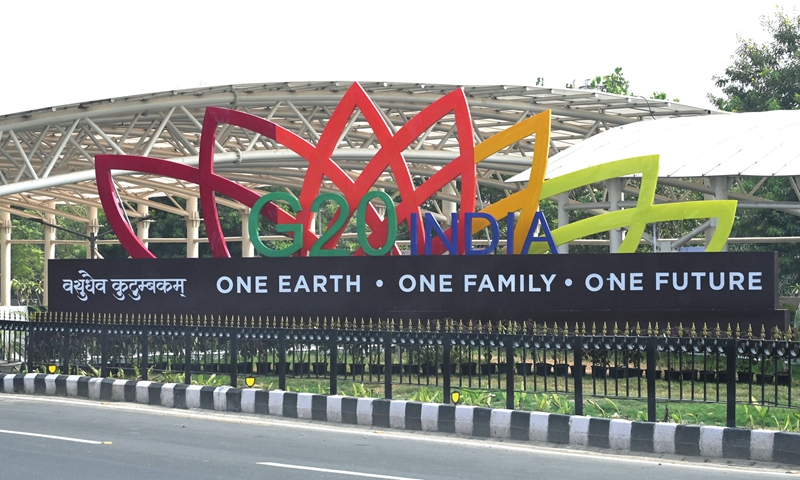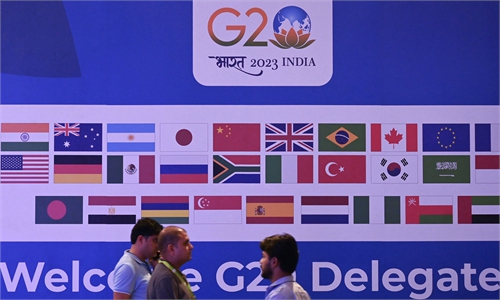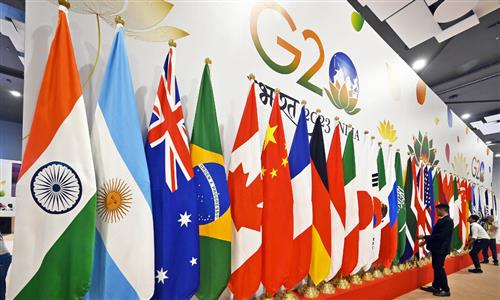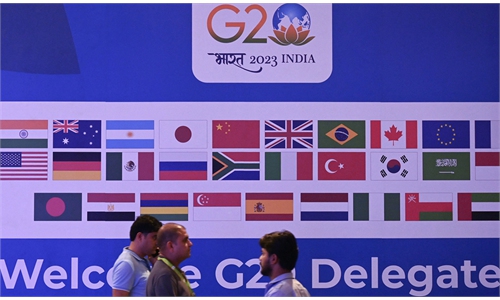
G20 installation outside Pragati Maidan on September 7, 2023 in New Delhi, India Photo: VCG
Editor's Note:
After the G20 Summit in New Delhi concluded on September 10 with a declaration pledging to tackle global economic challenges, the implementation of the economic cooperation plans and initiatives proposed during the summit has attracted widespread attention as coordinated global efforts are critical to the recovery of the global economy in face of strong headwinds.
Does the US plan to provide investments to support initiatives such as the India-Middle East-Europe Economic Corridor (IMEC) and multilateral development bank proposals, or is it just trying to make geopolitical gains through lip service? How should India reasonably handle economic cooperation with China and jointly contribute to the economic stability of the developing world? Three Chinese experts offer varying perspectives on these issues.
Huo Jianguo, a vice chairman of the China Society for World Trade Organization Studies in Beijing
Inclusive growth goal needs first eliminating interference of protectionism
Despite all the controversies and challenges, the smooth conclusion of the G20 New Delhi Summit with a declaration reflected the balance of interests between the Global South and Global North. The role of developing world in balancing the US-led West has increased to a certain extent.
The declaration of this summit did not include the "Russian-Ukrainian conflict" as the US intended. This is to a certain extent a victory for developing countries. At least, it demonstrates an improved balance between the developing countries and developed countries. The goal of the US to completely dominate the G20 agenda is becoming increasingly difficult to achieve.
But, in terms of specific issues, India, as the host country of this summit, actually has some of its own intentions to safeguard its own interests. For example, the launch of the IMEC implies a challenge to the Belt and Road Initiative (BRI) proposed by China and to undercut China's influence in related regions. Therefore, China needs to be wary that the G20 agenda will be mixed with the geopolitical intentions of the West led by the US.
However, the implementation of the IMEC program, which is expected to focus on infrastructure construction, requires large amount of capital investment. It remains questionable whether the US or India can provide financial support for this plan and associated projects. In the context of globalization, if China's advantages in infrastructure construction are excluded by geopolitical calculations, or the IMEC program is designed to confront the BRI, the prospects of this program will be limited.
In the declaration, G20 leaders committed to accelerating the realization of "strong, sustainable, balanced and inclusive growth." But for countries such as the US and India, the top priority is to first resolve the issue of protectionism. The irresponsible macroeconomic policies of the US and its "decoupling" push are still risks to the global economy.
Protectionism and "decoupling" moves go against the inevitable trend of globalization and seriously interfere with global economic and trade cooperation. Should the influence of protectionism cannot be effectively eliminated, it will be difficult to achieve the beautiful slogans such as inclusive growth.
Liu Zongyi, secretary-general of the Research Center for China-South Asia Cooperation at Shanghai Institutes for International Studies.
US-led West should provide real investment to proposed programs
The G20 is the primary platform for discussing global economic issues. The declaration of this year's G20 Summit in New Delhi, India, focuses on economic issues rather than geopolitical issues. This has returned to the right track. However, this summit only reached basic consensus, but no specific action plans, on the six core topics.
Global recovery still faces challenges, but, at present, the G20's role in promoting global economic cooperation to address global challenges has not been very effective. This is mainly because the US' containment and suppression of China prevents these two countries from reaching a consensus. Measures taken by the US attempting to exclude China from cooperation in the global industrial chain have made a global economic recovery more challenging.
China is the country that contributes the most to global economic growth. According to a World Bank report, China's average contribution to world economic growth from 2013 to 2021 reached 38.6 percent. This figure exceeds the combined contribution of G7 countries. Unlike Western countries, China has never attached political strings when assisting economic development for developing countries.
For example, it was China that first proposed and continuously advocated for the African Union to become a member of the G20. Following a successful BRICS summit held in South Africa this year, the African Union finally became a member of the G20.
As the global economy faces headwinds, developing countries are bearing the brunt. To improve their economic conditions, developing countries need to strengthen South-South cooperation.
The US promoted the so-called multilateral development banks plan during this summit. On the surface, it appears to be to support the development of developing countries, but in fact its geopolitical intention is very clear.
China welcomes multilateral financial organizations under Western control such as the World Bank and IMF, which can provide more tangible funds for the economic development of countries in the Global South and developing countries to support the infrastructure and industrial development.
It is hoped that the West, led by the US, can truly practice multilateralism, instead of using these economic cooperation plans as geopolitical tools while at the same time smearing China with rumors such as laying "debt traps" for emerging economies.
Qian Feng, director of the research department at the National Strategy Institute at Tsinghua University
India should not mix geopolitical factors while voicing for Global South
An obvious trend reflected in this year's G20 summit is that India hopes to use the opportunity as the G20 presidency country to expand its influence in the Global South and serve as a bridge between developing countries and the US-led West. The US actively support this, hoping to use India to achieve the goal of dividing developing countries and squeezing China's strategic space in developing world.
Prior to the New Delhi summit, many international observers were concerned that the summit would probably not be able to issue a joint declaration, as there were disputes in agenda setting between the US and India. Judging from the final declaration, the US has made certain concessions to India.
This summit highlighted the voices of developing countries and responded to the development demands of developing countries, including calling on developed countries to fulfill their aid commitments, WTO reform, and revitalizing multilateralism. It reflects that countries in the Global South are strengthening solidarity when the global economy encounters headwinds.
The West, led by the US, has also noticed that developing countries' rising complaints toward unfair treatments and they are unable to expand their influence in developing countries. As India's desire to become the leader of Global South countries becomes more pronounced, the US wants to use India's influence in developing countries while curbing China's influence in the developing world.
China and India are recognized as major and influential developing countries. They have consistent or similar positions in jointly safeguarding the interests of countries in the Global South, in terms of food security, establishing a multi-polar world and maintaining global economic stability. China welcomes India to speak out for the developing world and take concrete actions to promote the sustainable development of the southern world economy.
Hopefully, India will not inject too many political factors and geopolitical confrontation factors in voicing development needs of developing countries. India's efforts to cater to the US' intention to contain China will be futile. India's strategy in this sense is very detrimental to the healthy and stable development of China-Indian relations and is not conducive to promoting India's long-term economic development.



